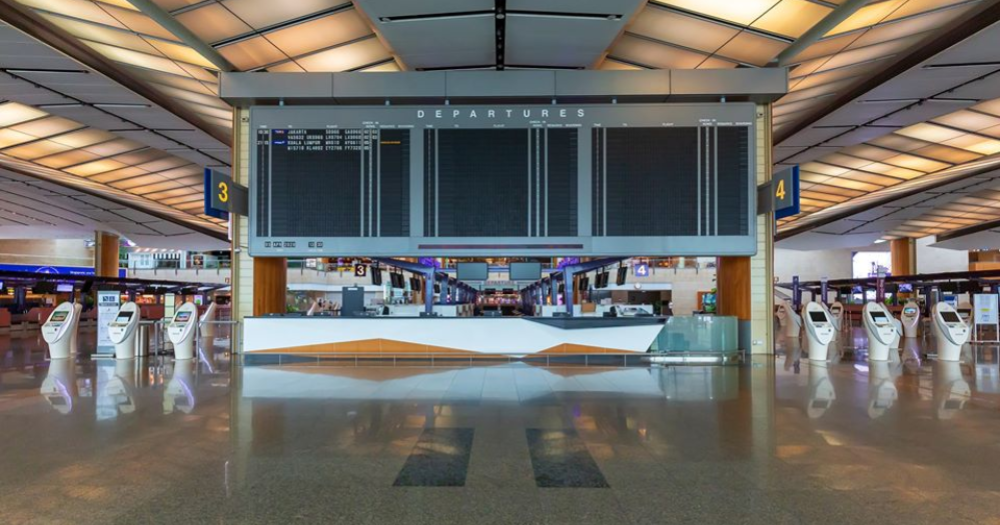On Valentine's Day this year, Prime Minister Lee Hsien Loong paid a visit to Changi Airport.
He posted on his Facebook page that the SATS baggage handlers at Changi Airport remained in good spirits despite Covid-19 having arrived on our shores by then.
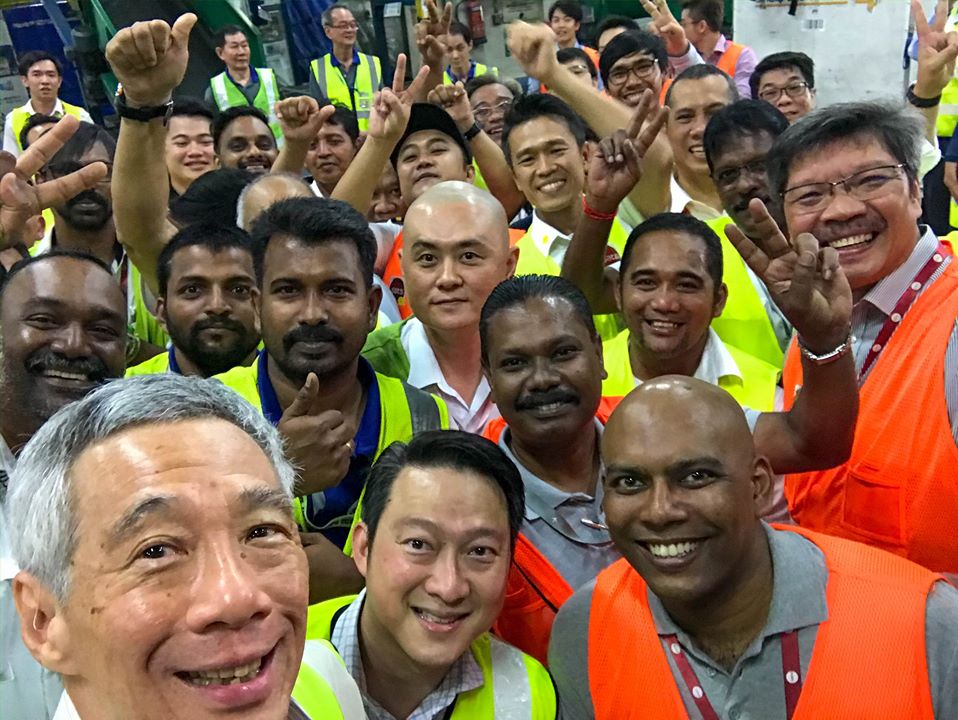 PM Lee with SATS handlers. Photo via PM Lee's Facebook page.
PM Lee with SATS handlers. Photo via PM Lee's Facebook page.
This optimism soon proved to be somewhat misplaced, though, unfortunately, with the aviation sector rapidly becoming one of the worst-hit in Singapore — and arguably, the rest of the world, too — by the global Covid-19 pandemic.
The Australia-based Centre for Aviation (CAPA) even warned that most airlines could be bankrupt by end-May, as travel restrictions have kicked in across the globe.
Our national carrier, Singapore Airlines, called Covid-19 "the greatest challenge it has faced in its existence", and ended up grounding an unprecedented 96 per cent of its fleet.
SIA is hardly the only one. The impact of the pandemic, and its resulting travel bans imposed nearly worldwide, has spread throughout the aviation industry.
Edward and Marion (not their real names) each hold managerial positions in separate local companies that provided cargo, catering, and cleaning services in the sector.
The Covid-19 outbreak has forced their businesses to completely cease operations in the last few weeks.
They spoke with Mothership on condition of anonymity about how their difficulties have been doubly compounded:
- First, their industry took a major hit early on in the outbreak, and will likely take longer to recover than most others.
- Also, as relatively small contractors, they are being missed out on important avenues for relief, such as investor bailouts and government aid.
Despite early warning signs, true severity of crisis was unprecedented
In Feb. 2020, the first local transmissions of Covid-19 were confirmed in Singapore, just before the Chinese New Year holiday.
"We start to think, eh, cannot play around. Getting dangerous lah. We tried to secure other business, come up with something, but we didn’t foresee that this thing would escalate at such a fast pace," said Edward.
And of course, escalate it did, as extensive travel restrictions on both inbound and outbound travellers were imposed by the end of March, both here and abroad.
"It started to spread into other countries, especially Europe and the U.S., and then we could see that a lot of flights were cancelled," said Marion.
"During SARS, it wasn’t this bad. There weren't as many cancelled flights," she added. "I didn’t know it would be 100 per cent suspension."
Contractors for SATS: low-skilled roles, many filled by seniors
Edward and Marion's companies work under SATS, which is the main contractor for airport ground handling and in-flight catering. SATS signs deals with airlines and parcels out the work to contractors, which are then responsible for providing the required manpower for the job.
According to Edward, the tasks outsourced in this manner include the cleaning of aircraft interiors, laundry services for airlines, cargo and baggage handling, catering, as well as driving cargo tractors and food delivery trucks.
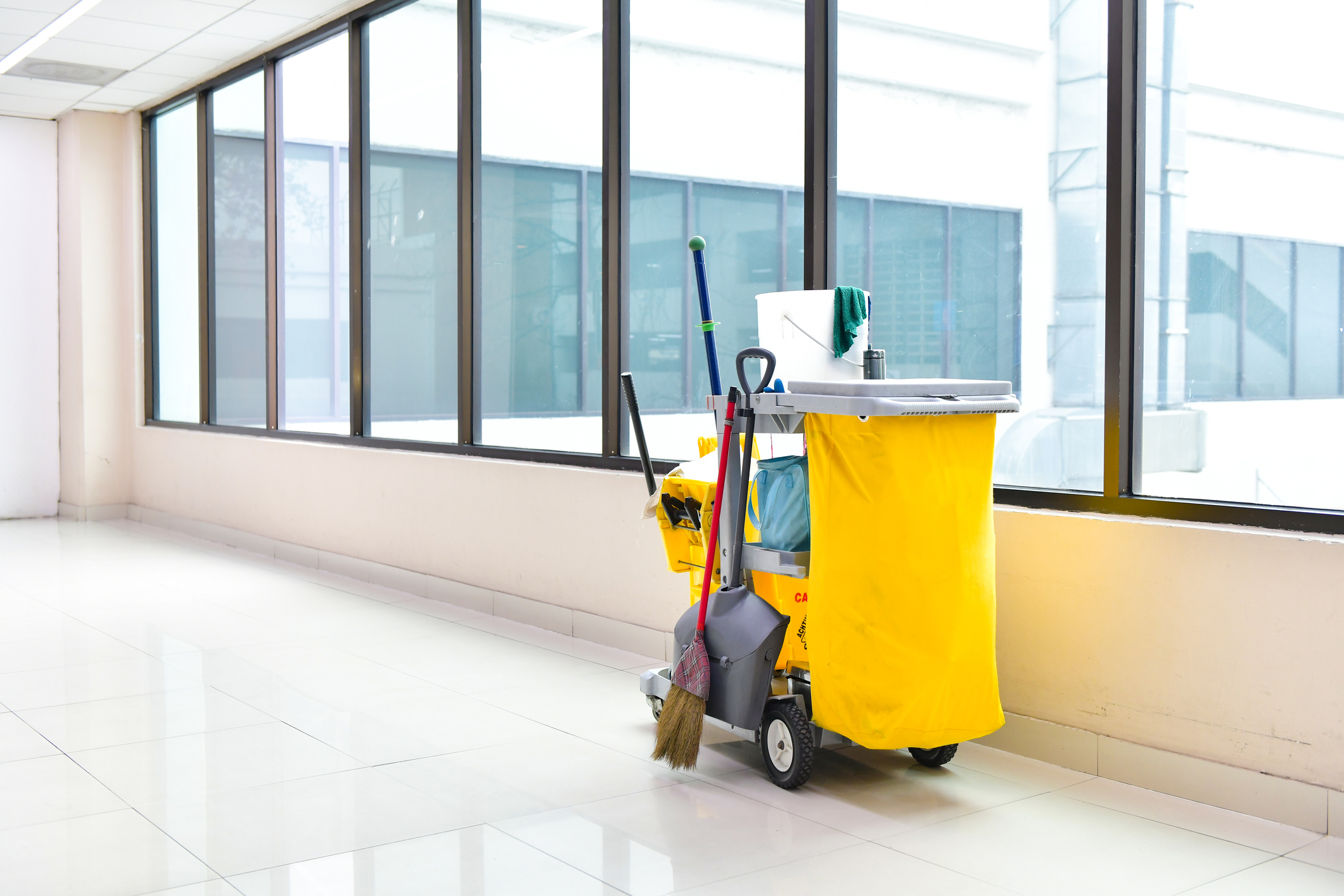 A cleaning cart. Photo via Getty Images.
A cleaning cart. Photo via Getty Images.
Consequently, most of the workers who do these jobs are from a vulnerable group, being low-skilled and lacking formal qualifications, he said, pointing out that many of them were also seniors.
Which is why, when the number of workers required by SATS was gradually reduced from Feb. onwards, Edward began to worry about what would happen to the hundreds of employees in his company. He recalled:
"How did I feel ah? I feel like sh*t lah. What am I going to do with those staff that are going to lose their livelihoods?"
Suspension of all services
By March, Marion recalls that there were just five flights operating out of each of Changi Airport's terminals per day.
As SATS scaled back its operations dramatically throughout the month, it started suspending contracts for jobs that kept — according to Edward's estimations — some 2,000 to 3,000 workers employed.
This culminated in a Mar. 23 meeting with SATS's management, where more than 10 contractors were told that their services would be suspended entirely, Marion and Edward said.
Some contracts were to be suspended by Mar. 24 — with just one day's notice. Edward said:
"We were, honestly speaking, at a loss lah. Because what makes for such a big business become no business at all?"
SATS could have chosen to terminate contracts instead, which would have given the contractors at least a month's notice.
This time could have been used to pre-empt their workers, who would then have been able to look for other jobs.
This is not to say that contractors would have preferred to be terminated, though. Having one's contracts terminated outright would also mean that, if and when demand resumes, the contractor companies face a new tender process in order to be re-appointed.
So arguably, this could well be a worse scenario for them, given that they may not re-secure the business in this follow-up round.
Responding to a query from Mothership, a SATS spokesperson said:
“With almost no passengers flying through Changi airport, SATS has had to make rapid, decisive changes to the deployment of our people, including our subcontractors. Some subcontractors have written to us to suspend services on their own accord. Others have acknowledged the extraordinary circumstances and agreed to suspend services until demand returns, at which point we will work closely together with them to ramp up services again."
Helped workers pick up short-term jobs in supermarket supply chains
Even though Edward's company has some contracts in other industries, redeploying the workers there was not an option — those projects were already fully staffed.
Besides this, many of the workers had performed the same roles for years, especially the more senior staff.
And so Edward and his company's management team took it upon themselves to try to find alternative employment for their workers, reaching out to various government agencies to seek help with job matching.
"We helped them temporarily find jobs first, at least they don’t go jobless", he said, recalling how some of his workers have managed to pick up short-term jobs in supermarket supply chains.
The eventuality of layoffs
Soon enough, however, Edward and Marion found themselves in the unenviable position of having to lay off workers, and/or put them on indefinite unpaid leave.
This was further complicated by safe distancing measures, Edward explained.
"For the number of people I had, it took me a good four to five days to address them in smaller groups, and then I have to say the same speech for four or five days."
"Should I ask them to go back home?"
Marion explained how the uncertainty of the situation created a difficult dilemma:
"Suspension means my whole company's operations have to be put on hold. So when it comes to my workers, do I have to pay them, or do I release them? If the work resumes, how can I get the workers back? So there's a struggle between, should I ask them to go back home, or should I ask them to stay?"
This was especially difficult for Marion, as the turnover rate at her company had just begun to stabilise after having posed a significant challenge for the past year or so.
"The turnover rate is high because it’s a low-wage job. So to hire locals, to want them to stay, is a challenge lah."
Contractors don't qualify for highest tier of aviation relief measures
And here's something that makes things worse: while the government has announced a slew of aviation-targeted relief measures, they seem to be of little help to Marion and Edward.
Enhanced jobs support scheme
Under the enhanced Jobs Support Scheme, firms in the aviation sector (specifically airlines, airport ground handlers, and airport operators) will receive nine months' worth of wage offsets, covering 75 per cent of the wages for every local worker in employment.
Marion's company was curiously excluded, even though its main business is in baggage handling, and only has contracts for work at the airport.
Instead, a check on IRAS's website showed that her company was eligible for the lowest tier of support.
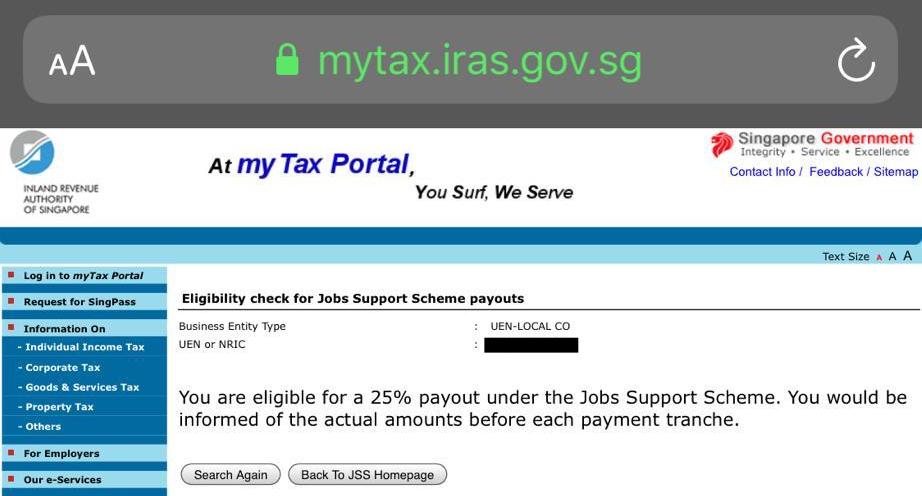 Screenshot from IRAS website on Apr. 9, courtesy of Marion.
Screenshot from IRAS website on Apr. 9, courtesy of Marion.
Edward's company, which has a handful of projects in other industries, apparently does not qualify for the enhanced tier as well. "We are hit as hard as [SATS], but we don't receive the help", he said, incredulously.
In any event, he acknowledges that his company would be unable to afford the remaining 25 per cent of workers' wages even if they did qualify for the higher percentage wage offset.
The Ministry of Finance (MOF), in a statement to Mothership, said that these businesses could submit an appeal, which would then be evaluated "based on the merits of each case".
Marion duly submitted an appeal to the ministry on Apr. 9, but has yet to hear back.
Relief directed at bigger players will likely take too long to trickle down
As Transport Minister Khaw Boon Wan explained in Parliament on Apr. 6, "swift action" to support the sector was taken "to prevent the loss of strategic capabilities and our hard earned position as a reliable air hub".
As a silver lining to his rather bleak speech, Khaw cited positive reports that SIA "looks well-positioned to emerge from the coronavirus crisis as an industry leader".
Needless to say, smaller companies such as Marion and Edward's are not in a position to receive unspecified "support" from state-linked Temasek Holdings, nor can they raise S$15 billion in bonds to tide them over.
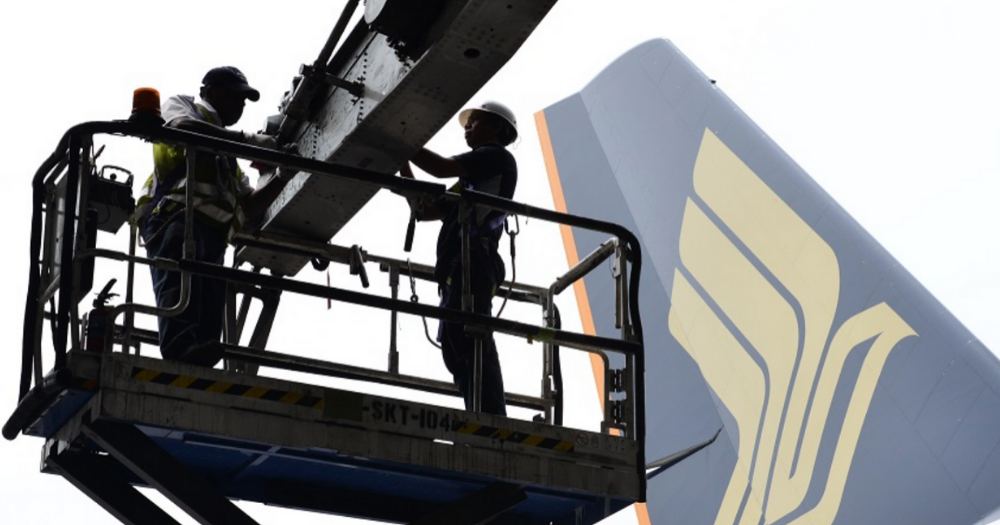 Maintenance work on an SIA plane. Photo via SIA Engineering website.
Maintenance work on an SIA plane. Photo via SIA Engineering website.
It appears that government action, geared towards the air hub ecosystem as a whole, is likely to take too long to trickle down to smaller players like SATS's contractors.
Neither can they plausibly count on SATS for much assistance, the latter of which is understandably focused on keeping its own direct employees at their jobs.
Legal action is out of the picture too, since contracts between SATS and its contractors were never drafted in anticipation of a suspension of this scale. Instead, documents Edward showed Mothership only provided for contractors' liability if they were unable to provide the requisite manpower to SATS.
A SATS spokesperson told Mothership that it has offered to help its contractors tap into a SkillsFuture Singapore training and support package for air transport companies that is geared towards "retraining and reskilling".
Marion and Edward are sceptical about their employees' interest in it, however, given the fact that most of them are of older age.
SATS, on the other hand, has nonetheless been able to send its own staff to be trained as airside drivers, according to a statement from Changi Airport Group, and is also now serving up meals to quarantined foreign workers.
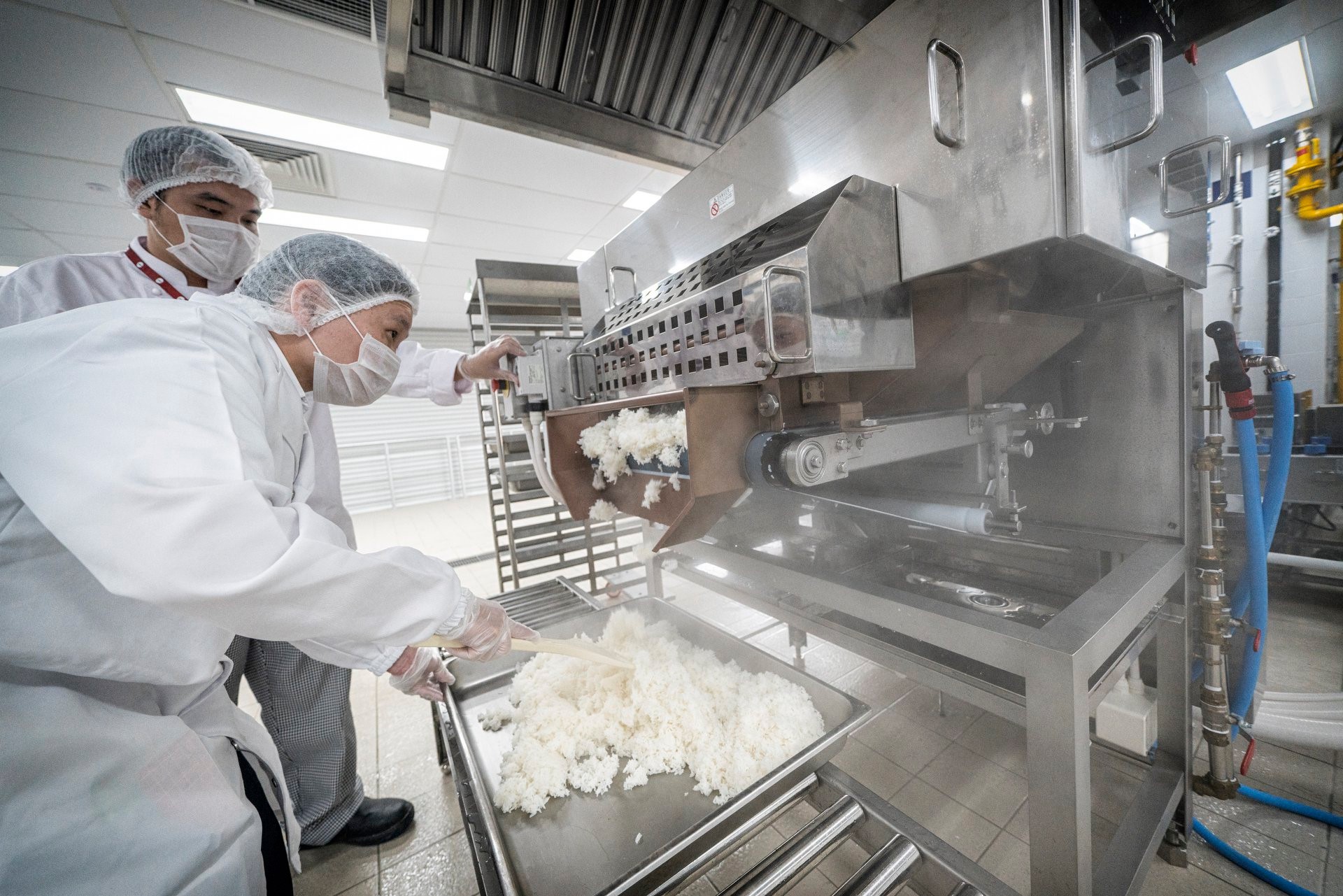 SATS’ automated rice line. Photo via Khaw Boon Wan on Facebook.
SATS’ automated rice line. Photo via Khaw Boon Wan on Facebook.
Thus, Edward and Marion seem to have few options other than to wait for an eventual recovery, though this will depend greatly on the broader international situation, which remains unstable.
Globally, the United Nations World Tourism Organisation (UNWTO) cautions that any predictions for tourism in 2020 at this point "are likely to be further revised", in light of the Covid-19 outbreak's "volatile and uncertain evolution".
Edward said:
"We just feel defeated lor. So many years of hard work. Because of one pandemic, everything is gone."
The road ahead
The 18-month closure of Changi Airport's Terminal 2 underscores the fact that recovery for the sector will be anything but swift.
Marion reminded us that, unlike many local businesses, companies like hers will not simply be able to resume their business after the circuit breaker period.
"If they really come up with a vaccine, then it might come back really fast," Marion said, tentatively. "But I’m really uncertain about that lah."
"Even if this thing clears, how do we build on from here? There’s a challenge ahead lah. We have to start again from scratch, everything," said Edward.
Seeking other business
Meanwhile, almost all of the workers at both companies are on unpaid leave, while most of the foreign nationals among them have returned to their homes in China and Malaysia.
Office staff at Marion's company continue to work from home, albeit for lesser hours, and lower pay.
Marion has yet to formally lay off any of her company's workers, leaving it open for them to pursue other job opportunities for now. "If the project resumes and they want to come back, they can come back", she said.
"A lot of industries, they don’t need people," said Edward.
"The only place that needs people are food manufacturers... but they are usually located at the west side, while most of my staff live on the east side, so my staff are also not keen to take up the re-employment."
Still, Edward hopes to secure contracts for general cleaning at the Singapore EXPO community isolation facility, which is being used to house recovering or mild Covid-19 cases.
"We’ve got to explore our options," said Edward, explaining that his company is also trying to predict where demand will be after the circuit breaker period, to pivot to those areas if possible.
"It's a big question mark for now, because we don’t know. For now, food deliveries will increase for the next two weeks. But we will have to look at the situation again, two weeks from now."
"No other choice what"
When asked what she thought about the future of the business, Marion let out a nervous laugh, and said:
"If [demand for flights] really still doesn't come back, then our worst-case scenario is that we really have to close down the company."
"I mean, we’ve been working for 20 years, it’s a bit wasted," she said.
A grim solidarity, however, comes through in Edward's voice as he ends our final phone call:
"We’re not the only ones lah. A lot of people, companies, businesses are getting hurt so badly by this pandemic. But we will tide through lah. We’ve got to. No other choice what."
Stories of Us is a series about ordinary people in Singapore and the unique ways they’re living their lives. Be it breaking away from conventions, pursuing an atypical passion, or the struggles they are facing, these stories remind us both of our individual uniqueness and our collective humanity.
Top photo by Lemjay Lucas Photography on Facebook. Quotes in this article have been edited for clarity.
If you like what you read, follow us on Facebook, Instagram, Twitter and Telegram to get the latest updates.
